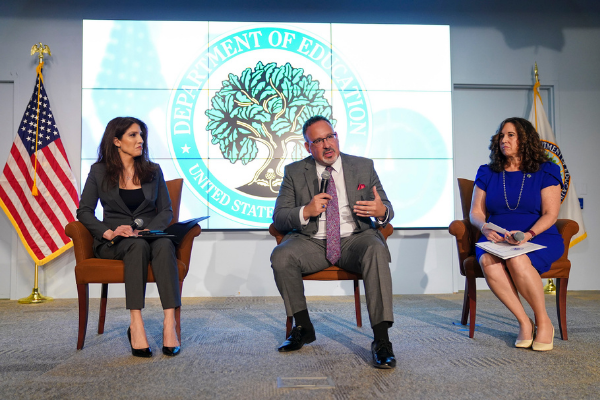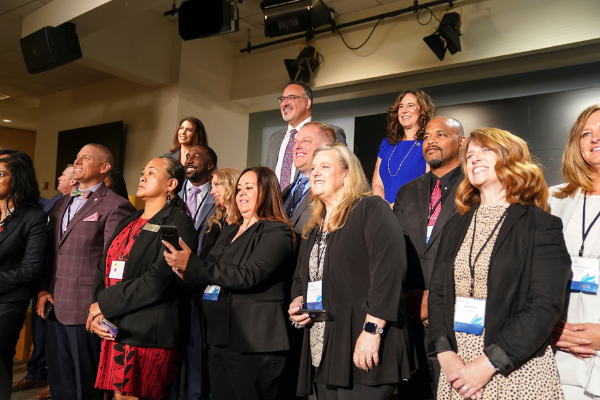At a day-long meeting yesterday at the U.S. Department of Education, around 60 school leaders shared their experiences using COVID-relief funding to help their students and offered their perspectives on the challenges that remain. They also participated in workshops on student wellness, equity, and educator burnout, among other topics. The convening kicked off NASSP’s Trailblazing Leadership Week in Washington, D.C., in which nationally recognized school leaders and student leaders are advocating for the needs of students and educators at the national level.
“Because of your unique role in your school communities, you have access to knowledge no one else has right now,” NASSP CEO Ronn Nozoe told participants. By meeting with federal officials, “you literally have a seat at the table.”

During a panel discussion with Secretary of Education Miguel Cardona, Deputy Secretary Cindy Marten, and Senior Adviser Lynda Lopez, school leaders discussed how their schools and districts have spent the $122 billion in American Rescue Plan Act (ARPA) funding for K–12 schools to support students’ mental health needs, bolster afterschool and enrichment programs, and improve school building air quality and infrastructure.
Dr. Evelyn Edney, the principal of Early College High School at Delaware State University in Dover, DE, and an NASSP board member, shared how federal funding has allowed her school to offer afterschool programs by partnering with community organizations, such as Junior Achievement, an organization focused on teaching young people about business, entrepreneurship, and financial literacy. The school has also partnered with The Center for Child Development so therapists can work with students and families.
Cardona praised such partnerships, emphasizing their importance in the wake of the pandemic. “I’d love to think we’re never going to go back to schools being silos in the community,” he said.
Harrison Bailey III, the principal of Liberty High School in Bethlehem, PA, said the wellness center his school established before the pandemic has been a “godsend.” But finding enough social workers to fully staff it has been a challenge. “To see the number of students I work with and the pain they’re in,” he said, his voice full of concern. He added that a local hospital told a parent that their child would have to wait six months to see the next available therapist.
“I hear you on the lack of certified staff,” Cardona said. He encouraged schools to put ARPA funds toward hiring retired teachers and principals on a contract basis to work with students in small groups. “Social and emotional well-being can improve if we have students connected to someone who cares,” he said.
After Keith L. Ball, the principal of Marietta High School and the 2021 Georgia Principal of the Year, shared how his school put ARPA funding toward establishing an evening school for students who needed to work during the day to financially support their families, Cardona urged school leaders to amplify such creative use of funds. “Those programs are what parents should be hearing about.”
By elevating specific examples of how ARPA has indeed helped schools and communities, school leaders can help put to rest the misguided notion that districts didn’t need this money, Cardona said. “Promote what you’re doing to serve children with the American Rescue Plan. Let that control the narrative.”

